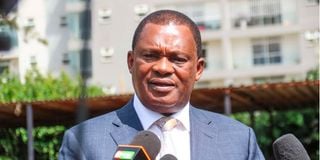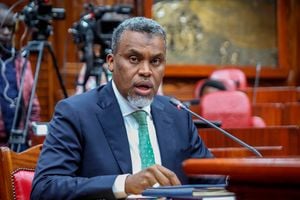
Cabinet Secretary for Public Service and Human Capital Development Justin Muturi addresses journalists after recording a statement at DCI offices at Kilimani Police Station on January 14, 2025.
The damning revelation by Public Service Cabinet Secretary Justin Muturi on alleged state-sanctioned abductions has triggered debate on his motive, political end game and the gap of more than six months after his son was seized by armed men at the height of the youth-led protests last June.
Mr Muturi took his abduction fight to President William Ruto’s doorstep on Tuesday January 14 as he began what he termed as pursuit of justice for his son, Leslie Muturi, who was abducted on June 22.
His mounting criticism of the government in the face of rising cases of abductions comes barely two weeks after he was heckled in Embu as mourners rejected President Ruto’s message which he was assigned to deliver during the funeral of Eric Mutugi — former Senator Lenny Kivuti’s son.
It also comes in the face of growing hostility against the Kenya Kwanza administration, especially in Mt Kenya.
Critics have questioned his timing, challenging him to come out clear on why it took him more than six months to raise the matter. Mr Muturi did not make any public statement about the matter around the time his son was abducted. Further, no statement was recorded with the police at the time.
It was only then Deputy President Rigathi Gachagua, in his address from Mombasa, that linked the National Intelligence Service (NIS) with the abductions.
“NIS is behind the abduction of protestors. If the son of the Attorney General can be abducted and to be held incommunicado for 18 hours, what about normal citizens,” said Mr Gachagua on June 26 while asking the intelligence agency’s boss Noordin Haji to leave office.
Further questions are around what Mr Muturi knew on the abductions and when he knew it as he was a member of the National Security Advisory Council.
Article 240 of the constitution establishes the National Security Council, consisting of the President, Deputy President, three cabinet secretaries in charge Defense, Foreign Affairs and Internal security, as well as Attorney-General, Chief of Kenya Defence Forces, Director-General of the National Intelligence Service, and the Inspector-General of the National Police Service.
The role of his son in the youth-led protests has also remained a mystery. Close family members of top government officials, including their children, openly participated in the nationwide protests but were not targeted by security agencies.
Mr Muturi told Nation Africa that he was equally surprised why his son was targeted. He said his son has never been told the crime he is accused of committing.
There is also speculation that President Ruto plans another reshuffle in government, which is likely to affect the Cabinet. Some say Mr Muturi’s open war with Dr Ruto could be part of his exit strategy in anticipation of the shakeup.
By coming out to talk about the wrongdoings of the government he is serving in at the highest level, Mr Muturi is seen to be seeking to leave the Cabinet as a hero, who was kicked out for speaking truth to power. Some have also seen it as mere political expediency to shore up his influence in the Mt Kenya region by riding on the wave of hostility against Dr Ruto’s administration.
“He should resign quietly and join Gachagua instead of dragging names of state officials like Noordin Haji (NIS Director General), who have no platform to defend themselves,” Central Organisation of Trade Unions (Cotu) Secretary General Francis Atwoli told Nation Africa.
“What has prompted him to speak now? We don’t want officials who resort to inciting the public against the government after losing favour with the President,” said Mr Atwoli.
National Assembly Majority Whip Sylvanus Osoro also accused Mr Muturi for going against the principle of collective responsibility by going out to accuse officials of the same government that he serves.
“You are a CS, you sit in the Cabinet, you meet with the president every day, you speak with the police every day, and you call press conferences to complain about the police,” said Mr Osoro.
Similar accusations were made by Aldai MP Marianne Kitany, who questioned Mr Muturi for not raising the matter in the Cabinet, where he sits.
“While you were the Attorney General why didn’t you go to the Cabinet and ask about your son and all Kenyan children? If a member of the Cabinet cannot say it before the President, what do you want an ordinary Kenyan to do? That is disrespecting our President and the Cabinet,” she said.
But in an interview with Nation Africa, Mr Muturi said he had resorted to escalating the matter and made it public that officials in the security sector refused to give him answers around the abduction of his son.
He also revealed that he was prompted to take the steps after he found himself under a barrage of criticism following the Embu funeral incident. He disclosed that some government officials were accused of being part of the conspiracy to have the mourners reject the President’s message.
Mr Muturi found himself in trouble when mourners shouted at him down as he prepared to read the President’ condolence message at the burial of former Embu Senator Kivuti’s son.
"I have been advised wisely, you know, as a former Speaker, nimeskia hiyo kura ya makelele (I have heard the vote by acclamation)," he said in response.
He proceeded to question how the government was unable to resolve the recent spate of abductions.
"We must own up to our own inefficiencies where they are pointed out or where they occur. We cannot be here saying the great things of a young soul, then the other day others are being taken every day. We cannot say we don’t know. I am actually surprised,” he said.
On Wednesday January 15, Mr Muturi told Nation Africa that he had sought for an open dialogue over the matter without anybody being intimidated. He said he got angered when he became a target after the Embu incident.
The Cabinet Secretary revealed that the President’s message was handed to him while already seated at the funeral. He said Mr Kivuti requested the church to allow him to speak last since he was set to read the President’s message. This was, however, rejected as the church allowed Mr Gachagua to speak after Mr Muturi.
“I think the church tricked us because Lenny had wanted them to have me speak last since I was to read the President’s message. But that did not happen. It is also true that the ground was hostile,” said Mr Muturi.
He said that his response to why the government should own up to the abductions was triggered by former Governor Kiraitu Murungi’s remarks challenging him to explain why the government was not aware of who was abducting youths.
“I got mad when people said I was part of the conspiracy in what happened. What I said was to own up as a government. I was not criticising the government. But the barrage of criticism that followed shocked me,” he said.
He also dismissed claims that his take on government has been prompted by his desire to run for Embu Governor. His critics have claimed that his attack on the government was designed to force the President to fire him to allow him ride on sympathy in running for the seat.
But Mr Muturi said he has no ambition of running for governor, Senator or MP. He described the governor job as the most difficult.
“I can never deal with MCAs. They are village tyrants who will make your work difficult. I have in the past made it clear that I will never run for governor, senator or MP positions. It has never crossed my mind,” said Mr Muturi.
He said having served in the Judiciary for 14 years, more than 10 years in the legislature — 10 of which he was the Speaker of the National Assembly — and now in the Executive, he was ready to quietly retire to private life when the time comes.
He also said that his son was yet to be told why he was abducted and held for hours.
“He has never been told what he is being accused of. But I think it is about the protests. My assessment was that he was arrested for being close with Mark Mwenje (Embakasi West MP). I think they were using the arrest to send a warning to Mwenje because he was being linked to the protests. The President asked me why anyone want to hold my son for the protests when even sons of (Mwangi) Kiunjuri and other officials were involved in the protests,” said Mr Muturi.









